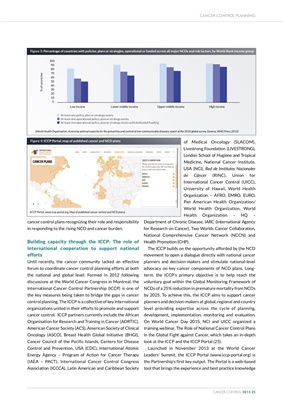
of Medical Oncology (SLACOM),
Livestrong Foundation (LIVESTRONG),
London School of Hygiene and Tropical
Medicine, National Cancer Institute,
USA (NCI), Red de Institutos Nacionales
de Cáncer (RINC), Union for
International Cancer Control (UICC),
University of Hawaii, World Health
Organization - AFRO, EMRO, EURO,
Pan American Health Organization/
World Health Organization, World
Health Organization - HQ -
Department of Chronic Disease, IARC (International Agency
for Research on Cancer), Two Worlds Cancer Collaboration,
National Comprehensive Cancer Network (NCCN) and
Health Promotion (CHP).
The ICCP builds on the opportunity afforded by the NCD
movement to open a dialogue directly with national cancer
planners and decision-makers and stimulate national-level
advocacy on key cancer components of NCD plans. Longterm,
the ICCP's primary objective is to help reach the
voluntary goal within the Global Monitoring Framework of
NCDs of a 25% reduction in premature mortality from NCDs
by 2025. To achieve this, the ICCP aims to support cancer
planners and decision-makers at global, regional and country
level providing expertise across the cycle of planning,
development, implementation, monitoring and evaluation.
On World Cancer Day 2015, NCI and UICC organized a
training webinar, The Role of National Cancer Control Plans
in the Global Fight against Cancer, which takes an in-depth
look at the ICCP and the ICCP Portal (25).
Launched in November 2013 at the World Cancer
Leaders' Summit, the ICCP Portal (www.iccp-portal.org) is
the Partnership's first key output. The Portal is a web-based
tool that brings the experience and best practice knowledge
CANCER CONTROL PLANNING
CANCER CONTROL 2015 25
cancer control plans recognizing their role and responsibility
in responding to the rising NCD and cancer burden.
Building capacity through the ICCP: The role of
international cooperation to support national
efforts
Until recently, the cancer community lacked an effective
forum to coordinate cancer control planning efforts at both
the national and global level. Formed in 2012 following
discussions at the World Cancer Congress in Montreal, the
International Cancer Control Partnership (ICCP) is one of
the key measures being taken to bridge the gaps in cancer
control planning. The ICCP is a collective of key international
organizations united in their efforts to promote and support
cancer control. ICCP partners currently include the African
Organisation for Research and Training in Cancer (AORTIC),
American Cancer Society (ACS), American Society of Clinical
Oncology (ASCO), Breast Health Global Initiative (BHGI),
Cancer Council of the Pacific Islands, Centers for Disease
Control and Prevention, USA (CDC), International Atomic
Energy Agency - Program of Action for Cancer Therapy
(IAEA - PACT), International Cancer Control Congress
Association (ICCCA), Latin American and Caribbean Society
At least one policy, plan or strategy exists
At least one operational policy, plan or strategy exists
At least one operational policy, plan or strategy exists with dedicated funding
100
90
80
70
60
50
40
30
20
10
0
% of countries
Low-income Lower-middle-income Upper-middle-income High-income
Figure 3: Percentage of countries with policies, plans or strategies, operational or funded across all major NCDs and risk factors, by World Bank income group
Figure 4: ICCP Portal, map of published cancer and NCD plans
(World Health Organisation, Assessing national capacity for the prevention and control of non-communicable diseases: report of the 2010 global survey, Geneva, WHO Press: 2012)
(ICCP Portal, www.iccp-portal.org, Map of published cancer control and NCD plans)